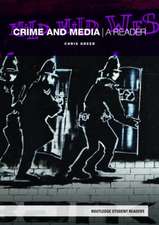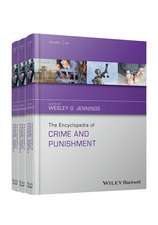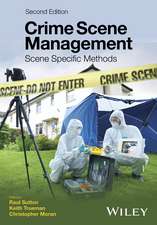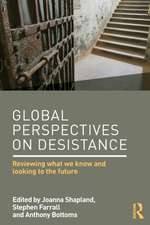Organised Crime in European Businesses: Routledge Studies in Crime and Society
Editat de Ernesto Savona, Michele Riccardi, Giulia Berlusconien Limba Engleză Paperback – 6 feb 2018
Building on empirical evidence from the Netherlands, Slovenia, Spain, Sweden, the UK, Ireland, Italy, France and Finland, Organised Crime in European Businesses is divided into four parts. Part I explores the infiltration of legitimate businesses to conceal and facilitate illicit trafficking. Part II examines the infiltration of legitimate businesses to develop fraud schemes. Part III focuses on the infiltration of legitimate businesses to control the territory and influence policy makers. Part IV concludes by considering the research and policy implications in light of these findings.
Bringing together leading experts and detailed case studies, this book considers the infiltration of organised crime in legitimate business around Europe. It is an ideal resource for students and academics in the fields of criminology, economics and sociology, as well as private sector practitioners, public officials and policy makers.
| Toate formatele și edițiile | Preț | Express |
|---|---|---|
| Paperback (1) | 312.43 lei 6-8 săpt. | |
| Taylor & Francis – 6 feb 2018 | 312.43 lei 6-8 săpt. | |
| Hardback (1) | 820.71 lei 6-8 săpt. | |
| Taylor & Francis – 2 aug 2016 | 820.71 lei 6-8 săpt. |
Din seria Routledge Studies in Crime and Society
-
 Preț: 281.03 lei
Preț: 281.03 lei -
 Preț: 282.33 lei
Preț: 282.33 lei -
 Preț: 289.93 lei
Preț: 289.93 lei -
 Preț: 311.41 lei
Preț: 311.41 lei -
 Preț: 385.00 lei
Preț: 385.00 lei -
 Preț: 293.25 lei
Preț: 293.25 lei -
 Preț: 308.75 lei
Preț: 308.75 lei -
 Preț: 308.78 lei
Preț: 308.78 lei -
 Preț: 294.19 lei
Preț: 294.19 lei - 20%
 Preț: 279.06 lei
Preț: 279.06 lei - 9%
 Preț: 934.76 lei
Preț: 934.76 lei - 9%
 Preț: 935.91 lei
Preț: 935.91 lei -
 Preț: 346.90 lei
Preț: 346.90 lei -
 Preț: 437.34 lei
Preț: 437.34 lei -
 Preț: 469.34 lei
Preț: 469.34 lei -
 Preț: 469.34 lei
Preț: 469.34 lei -
 Preț: 430.37 lei
Preț: 430.37 lei -
 Preț: 384.59 lei
Preț: 384.59 lei - 18%
 Preț: 997.11 lei
Preț: 997.11 lei - 18%
 Preț: 996.33 lei
Preț: 996.33 lei - 18%
 Preț: 1108.42 lei
Preț: 1108.42 lei - 18%
 Preț: 1006.60 lei
Preț: 1006.60 lei - 14%
 Preț: 325.34 lei
Preț: 325.34 lei - 18%
 Preț: 1056.00 lei
Preț: 1056.00 lei -
 Preț: 348.77 lei
Preț: 348.77 lei -
 Preț: 240.38 lei
Preț: 240.38 lei -
 Preț: 277.78 lei
Preț: 277.78 lei - 18%
 Preț: 1009.55 lei
Preț: 1009.55 lei - 13%
 Preț: 336.90 lei
Preț: 336.90 lei - 18%
 Preț: 1001.84 lei
Preț: 1001.84 lei - 20%
 Preț: 1104.66 lei
Preț: 1104.66 lei - 18%
 Preț: 1051.55 lei
Preț: 1051.55 lei - 20%
 Preț: 1048.59 lei
Preț: 1048.59 lei -
 Preț: 409.90 lei
Preț: 409.90 lei - 12%
 Preț: 325.34 lei
Preț: 325.34 lei - 18%
 Preț: 1161.10 lei
Preț: 1161.10 lei - 26%
 Preț: 764.77 lei
Preț: 764.77 lei - 20%
 Preț: 1042.80 lei
Preț: 1042.80 lei
Preț: 312.43 lei
Preț vechi: 356.63 lei
-12% Nou
Puncte Express: 469
Preț estimativ în valută:
59.78€ • 62.42$ • 49.48£
59.78€ • 62.42$ • 49.48£
Carte tipărită la comandă
Livrare economică 05-19 aprilie
Preluare comenzi: 021 569.72.76
Specificații
ISBN-13: 9781138499478
ISBN-10: 1138499471
Pagini: 242
Ilustrații: 17 Line drawings, black and white; 21 Tables, black and white; 17 Illustrations, black and white
Dimensiuni: 156 x 234 x 18 mm
Greutate: 0.45 kg
Ediția:1
Editura: Taylor & Francis
Colecția Routledge
Seria Routledge Studies in Crime and Society
Locul publicării:Oxford, United Kingdom
ISBN-10: 1138499471
Pagini: 242
Ilustrații: 17 Line drawings, black and white; 21 Tables, black and white; 17 Illustrations, black and white
Dimensiuni: 156 x 234 x 18 mm
Greutate: 0.45 kg
Ediția:1
Editura: Taylor & Francis
Colecția Routledge
Seria Routledge Studies in Crime and Society
Locul publicării:Oxford, United Kingdom
Public țintă
Postgraduate and UndergraduateCuprins
Introduction (Ernesto U. Savona)
1. Organised criminals and the legal economy (Giulia Berlusconi)
2. Measuring organised crime infiltration in legal businesses (Michele Riccardi and Giulia Berlusconi)
Part I: Infiltrating legitimate businesses to conceal and facilitate illicit trafficking
3. Transportation companies to hide transit crimes. Organised crime infiltration in the Netherlands (Joras Ferwerda and Brigitte Unger)
4. The sex market, bars and nightclubs. Criminal infiltration in Slovenia (Boštjan Slak, Maja Modic, Katja Eman and Branko Ažman)
5. From drug trafficking to wholesale trade business. Organised crime infiltration in Spain (Jesús Palomo, Jerónimo Márquez and Pilar Laguna)
Part II: Infiltrating legitimate businesses to develop fraud schemes
6. Social welfare fraud and criminal infiltration in Sweden (Johanna Skinnari, Lars Korsell and Helena Rönnblom)
7. Crash-for-cash and VAT carousels. Organised crime infiltration in the United Kingdom (David Wall, Yulia Chistyakova and Stefano Bonino)
Part III: Infiltrating legitimate businesses to control the territory and influence policy makers
8. Mafia infiltration in legitimate companies in Italy. From traditional sectors to emerging businesses (Michele Riccardi, Cristina Soriani and Valentina Giampietri)
9. Grand banditisme traditionnel and foreign groups. Organised crime infiltration in France (Michele Riccardi and Diana Camerini)
10. From bikers to entrepreneurs. Motorcycle gangs infiltration in Finland (Sarianna Petrell and Jarmo Houtsonen)
Part IV: Research and policy implications
11. The impact of organised crime infiltration on the European legitimate economy (John Walker)
12. From the analysis of criminal infiltration to the assessment of its risk (Lorella Garofalo)
Conclusions (Ernesto U. Savona)
1. Organised criminals and the legal economy (Giulia Berlusconi)
2. Measuring organised crime infiltration in legal businesses (Michele Riccardi and Giulia Berlusconi)
Part I: Infiltrating legitimate businesses to conceal and facilitate illicit trafficking
3. Transportation companies to hide transit crimes. Organised crime infiltration in the Netherlands (Joras Ferwerda and Brigitte Unger)
4. The sex market, bars and nightclubs. Criminal infiltration in Slovenia (Boštjan Slak, Maja Modic, Katja Eman and Branko Ažman)
5. From drug trafficking to wholesale trade business. Organised crime infiltration in Spain (Jesús Palomo, Jerónimo Márquez and Pilar Laguna)
Part II: Infiltrating legitimate businesses to develop fraud schemes
6. Social welfare fraud and criminal infiltration in Sweden (Johanna Skinnari, Lars Korsell and Helena Rönnblom)
7. Crash-for-cash and VAT carousels. Organised crime infiltration in the United Kingdom (David Wall, Yulia Chistyakova and Stefano Bonino)
Part III: Infiltrating legitimate businesses to control the territory and influence policy makers
8. Mafia infiltration in legitimate companies in Italy. From traditional sectors to emerging businesses (Michele Riccardi, Cristina Soriani and Valentina Giampietri)
9. Grand banditisme traditionnel and foreign groups. Organised crime infiltration in France (Michele Riccardi and Diana Camerini)
10. From bikers to entrepreneurs. Motorcycle gangs infiltration in Finland (Sarianna Petrell and Jarmo Houtsonen)
Part IV: Research and policy implications
11. The impact of organised crime infiltration on the European legitimate economy (John Walker)
12. From the analysis of criminal infiltration to the assessment of its risk (Lorella Garofalo)
Conclusions (Ernesto U. Savona)
Notă biografică
Ernesto U. Savona is Professor of Criminology at the Università Cattolica del Sacro Cuore, Italy. He is also Director of Transcrime, the Joint Research Centre on Transnational Crime of the Università Cattolica del Sacro Cuore.
Michele Riccardi is Adjunct Professor of Business Economics at the Università Cattolica del Sacro Cuore, Italy, and senior researcher at Transcrime.
Giulia Berlusconi is Postdoctoral Fellow at the Faculty of Political and Social Sciences, Università Cattolica del Sacro Cuore, Italy, and researcher at Transcrime.
Michele Riccardi is Adjunct Professor of Business Economics at the Università Cattolica del Sacro Cuore, Italy, and senior researcher at Transcrime.
Giulia Berlusconi is Postdoctoral Fellow at the Faculty of Political and Social Sciences, Università Cattolica del Sacro Cuore, Italy, and researcher at Transcrime.
Recenzii
"This book reflects the important findings of cutting-edge research. It demonstrates the frightening scale of organised crime investment in the legitimate economy, and the negative effects of this phenomenon. Tracing and recovering the proceeds of crime remains a major strategic challenge for law enforcement agencies across Europe, so this publication is as timely as it is important."
Rob Wainwright, Director of Europol
"This timely book is a must-read for academics and practitioners who want to know more about criminal infiltration and the various ways in which criminal activities and the legitimate economy are intertwined in a wide array of European countries."
Edward R. Kleemans, Full Professor and Chair of Serious and Organized Crime and Criminal Justice, VU University Amsterdam, the Netherlands
"New criminals have moved away from the Dickensian den of thieves and now reside in posh city centre offices. With the aid of accountants, lawyers and financial experts they devise new extortion rackets and malpractices that are threatening the fabric of state and society. This interdisciplinary book presents meticulously researched case studies to show how the criminal elites operate under the guise of business and professionalism. It is a must read for students, scholars and policymakers."
Prem Sikka, Professor of Accounting, Essex Business School, University of Essex, UK
Rob Wainwright, Director of Europol
"This timely book is a must-read for academics and practitioners who want to know more about criminal infiltration and the various ways in which criminal activities and the legitimate economy are intertwined in a wide array of European countries."
Edward R. Kleemans, Full Professor and Chair of Serious and Organized Crime and Criminal Justice, VU University Amsterdam, the Netherlands
"New criminals have moved away from the Dickensian den of thieves and now reside in posh city centre offices. With the aid of accountants, lawyers and financial experts they devise new extortion rackets and malpractices that are threatening the fabric of state and society. This interdisciplinary book presents meticulously researched case studies to show how the criminal elites operate under the guise of business and professionalism. It is a must read for students, scholars and policymakers."
Prem Sikka, Professor of Accounting, Essex Business School, University of Essex, UK
Descriere
Bringing together leading experts and case studies, this book considers the infiltration of organised crime in legitimate business around Europe, considering the purposes and methods of infiltration and the implications for policy and research.










